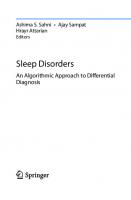Psychopathology: An Integrative Approach to Mental Disorders [9 ed.] 9780357657911, 9780357657843, 9780357657850
2,522 389 313MB
English Pages [822] Year 2023
00-(FrontMatter)
01-PsychopathologyInHistoricalContext
02-AnIntegrativeApproachToPsychopathology
03-ClinicalAssessmentAndDiagnosis
04-ResearchMethods
05-AnxietyTraumaAndStressorRelatedAndObsessiveCompulsiveAndRelatedDisorders
06-SomaticSymptomAndRelatedDisordersAndDissociativeDisorders
07-MoodDisordersAndSuicide
08-EatingAndSleepWakeDisorders
09-PhysicalDisordersAndHealthPsychology
10-SexualDysfunctionsParaphilicDisordersAndGenderDysphoria
11-SubstanceRelatedAddictiveAndImpulseControlDisorders
12-PersonalityDisorders
13-SchizophreniaSpectrumAndOtherPsychoticDisorders
14-NeurodevelopmentalDisorders
15-NeurocognitiveDisorders
16-MentalHealthServicesLegalAndEthicalIssues
17-(AppendixA)-DSM5Classifications
18-(AppendixB)-DSM5DisordersForFurtherStudy
19-(Glossary)
20-(References)
21-(NameIndex)
22-(SubjectIndex)
Recommend Papers
![Psychopathology: An Integrative Approach to Mental Disorders [9 ed.]
9780357657911, 9780357657843, 9780357657850](https://ebin.pub/img/200x200/psychopathology-an-integrative-approach-to-mental-disorders-9nbsped-9780357657911-9780357657843-9780357657850.jpg)
- Author / Uploaded
- David H. Barlow
- V. Mark Durand
- Stefan G. Hofmann
- Similar Topics
- Psychology
- Commentary
- Sourced from e-book consisting of images of pages, then run through OCR.
File loading please wait...
Citation preview
PSYCHOPATHOLOGY
An Integrative Approach to Mental Disorders
i"
C,!fly1'iit.r 2023 C'e,•t:•s.e l ~ 1t 1tir1g.. All Rithls: R~U1Ure 1hird p;'IRy ()(lflten1Jl) :'I)' ~ 1'1lJ)l)(t'.~$eJ fn::>rn d1r:.eR, M)k :l1'1dll!r e(]L'lf')le.r()":), Editorial rc\'icw has dcemod lh.lt any :supprcssod coo1cm docs not materially affect the overall learning experience.. Ccng.:ig_c L~ing rescn.'es the rig_ht to remo\'c: .'.ldditional contc.nt at any time if subscqucm rights rcstric1ions ~ire ii.
~:Cengage Austral ia • Bra zil • Canada • Mexico · Singapore· United Kingdom • United States
Cc"l)Yrif!h l 202~ C"'t:11!1,lltlt: l..e:1rn(ng.. All l~lf.lll.lii R~,·C(I. (',.fa)' nr!l. he c"'
j Psychological Dimensions
Dr. Kelly Klump and her colleagues have conducted research highlighting the importa nce of ovarian hormones in predicting disordered eating, particularly binge-eating episodes.
serotonin-that pass through it to determine whether something is malfunctioning when eating disorders occur (Kaye, 2008; Vitiello & Lederhendler, 2000). Low levels of serotonergic activity, the system most often associated with eating disorders (Russell, 2009; Steiger, Bruce, & Groleau, 2011 ), are associated with impulsivity generally and binge eating specifically (see Chapter 2). Thus, most drugs under study as treatments for eating disorders target the serotonin system (see, for example, Grilo, Crosby, Wilson, & Masheb, 2012; Kaye, 2008). Biological investigators are also interested in the influence of hormones on eating behavior, particularly binge eating, which is an important component of bulimia. ln an impressive program of research, Kelly Klump and colleagues found strong associations ben,veen ovarian hormones and dysregulated or impulsive eating in women prone to binge-eating episodes (Klump et al., 2014). Furthermore, emotional eating behavior (eating to relieve stress or anxiety) and binge-eating frequencies peaked in the postovulatory phases of the menstrual cycle for all women whether they binged or not during other phases of their cycle. High levels of hormones at least partially accounted for these peaks. In an interesting bit of theorizing, Klump and her colleagues, noting the strong association between the onset of bulimia and puberty, speculate that the onset of puberty and associated hormonal changes may "turn on" certain hormone responsive risk genes in women prone to binge eating to begin with because they possess these genetic patterns. If true, this would be another example of the kind of gene-environment interactions discussed in Chapter 2. If investigators do find a strong association between neurobiological functions and eating disorders, the question of cause or effect remains. At present, the consensus is that some neurobiological abnormalities do exist in people with eating disorders (for example, Marsh et al., 20ll; Mainz, Schulte-RUther, Fink, Herpertz-Dahlmann, & Konrad, 2012) but that they may be a result of semistarvation or
282
Chapter 8
Clinical observations over the years have indicated that many young women with eating disorders have a diminished sense of personal control and confidence in their own abilities and talents (Bruch, 1973, 1985; Striegel-Moore, Silberstein, & Rodin, 1993; Walters & Kendler, 1995). This may manifest as strikingly low selfesteem (Fairburn, Cooper, & Shafran, 2003). They also display more perfectionistic attitudes, perhaps learned or inherited from their families, which may reflect attempts to exert control over important events in their lives (Boone, Soenens, Vansteenkiste, & Braet, 2012; Bulik et al., 2014; Fairburn, Halmi et al., 2012; Joiner et al., 1997; Martinez & Craighead, 2015; Welch, et al., 1997). Shafran, Lee, Payne, and Fairburn (2006) artificially raised perfectionistic standards in otherwise normal women by instructing them to pursue the highest possible standards in everything they did for the next 24 hours. These instructions caused them to eat fewer high-calorie foods, to restrict their eating, and to have more regret after eating than women told to just do the minimum for 24 hours. This occurred even though eating was not specifically mentioned as part of pursuing the "highest standards'.' Perfectionism alone, however, is only weakly associated with the development of an eating disorder because individuals must consider themselves overweight and manifest low self-esteem before the trait of perfectionism makes a contribution (Vohs, Bartlone, Joiner, Abramson, & Heatherton, 1999). But when perfectionism is directed to distorted perception of body image, a powerful engine to drive eating disorder behavior is in place (Lilenfeld, Wonderlich, Riso, Crosby, & Mitchell, 2006; Shafran, Cooper, & Fairburn, 2002). Women with eating disorders are intensely preoccupied ½rith how they appear to others (Fairburn, Christopher Fairburn develStice, et al., 2003; Smith et al., 2007). oped an effective psychosocial They also perceive themselves treatment for bulimia nervosa.
Eating and Sleep-Wake Disorders
c,,)yrig_hr 2023 Ceu~1ge l ..e.1rnir)g.. All Rights R~~\·O:I. 1'.fa)' llfl( he Ct)J'Kecl. ~c;1Med, ..,, dt.11)lie;;:i1ed, i11 ..~:hl)]e c"I( irl p;i tl. n,1e II) c;:l~'1(c)1liC tiih1~. S(Hne 1hir~I p.'1111 C,Orllell1 111:,y be s.u1)1~s~~I ft01n llw: e R()l1k .:11)(Vc)r eOl.'lpl
![Psychopathology: An Integrative Approach to Mental Disorders (MindTap Course List) [9 ed.]
0357657845, 9780357657843](https://ebin.pub/img/200x200/psychopathology-an-integrative-approach-to-mental-disorders-mindtap-course-list-9nbsped-0357657845-9780357657843.jpg)


![Assessments in Occupational Therapy Mental Health: An Integrative Approach [4 ed.]
163091813X, 9781630918132](https://ebin.pub/img/200x200/assessments-in-occupational-therapy-mental-health-an-integrative-approach-4nbsped-163091813x-9781630918132.jpg)



![Abnormal Psychology: An Integrative Approach [8 ed.]
9781305950443](https://ebin.pub/img/200x200/abnormal-psychology-an-integrative-approach-8nbsped-9781305950443.jpg)
![Psychopathology and Philosophy of Mind: What Mental Disorders Can Tell Us About Our Minds [1 ed.]
0367444585, 9780367444587](https://ebin.pub/img/200x200/psychopathology-and-philosophy-of-mind-what-mental-disorders-can-tell-us-about-our-minds-1nbsped-0367444585-9780367444587.jpg)
